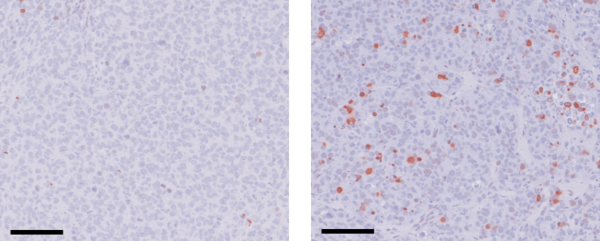The Hopp Children’s Cancer Center Heidelberg (KiTZ) is a joint institution of the German Cancer Research Center (DKFZ), University Hospital Heidelberg (UKHD) and the University of Heidelberg (Uni HD).
Ewing sarcoma is a highly aggressive type of cancer that can form in bones or soft tissue and often occurs in children and young people. Many standard therapies fail in this type of cancer, so there is an urgent need for new treatment options.
In order to be able to develop new treatments, researchers are constantly looking for new potential targets for active pharmaceutical ingredients. Now scientists at the Hopp Children’s Cancer Center Heidelberg (KiTZ), working with scientists from the German Cancer Research Center (DKFZ) and LMU Munich, may have found a suitable target: The RRM2 enzyme appears to play a role in the development of the aggressive Ewing sarcoma, which means it represents a new therapeutic target.
To find the new target structure, the researchers started by conducting a comprehensive database analysis. They looked through the clinical data of patients with Ewing sarcoma for targets that are overproduced in these patients by comparison with healthy people. In their research, they concentrated on patients with a very poor prognosis and on targets for which drugs have been found in the past – even if they have not yet been tested on patients with Ewing sarcoma. This is how they found RRM2.
Further investigations revealed that a drug known to inhibit RRM2 can significantly reduce the cell growth of Ewing sarcoma cells. Surprisingly, the experiments showed that the drug was effective against RRM2 even when the Ewing sarcoma cells had long since become unresponsive to standard treatment. Because tumor cells can quickly become resistant to the drugs used to treat them, especially when the drugs are used in isolation, the scientists also identified in advance other drugs that work in synergy with the RRM2 inhibitor and so help prevent the development of resistance. “The findings of our preclinical analyses provide first indications that the new therapy approach could present a treatment option, particularly for patients who have become resistant to chemotherapy over time,” says Thomas Grünewald, head of the Translational Pediatric Sarcoma Research group at the KiTZ and head of the DKFZ division of the same name.
The scientists also found indications that RRM2 could be useful as a prognostic marker as well – for predicting the course of the disease. They were able to show that increased formation of RRM2 in the Ewing sarcoma cells is accompanied by very early metastasis. The underlying mechanism is due to be investigated in a follow-up study.
Grünewald’s research group is now planning validation studies to confirm the findings. He estimates that they could take up to three years. If they are successful, they will be followed by early clinical trials (phase 1/2 trials), which could start treating patients.
Original publication:
Ohmura et al. Translational evidence for RRM2 as a prognostic biomarker and therapeutic target in Ewing sarcoma. In: Mol Cancer20, 97 (2021). doi.org/10.1186/s12943-021-01393-9 (Online Publication).




